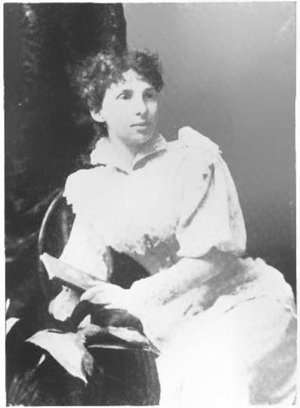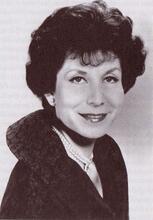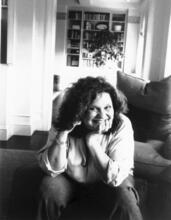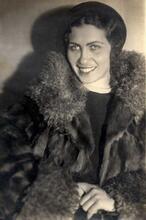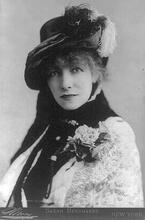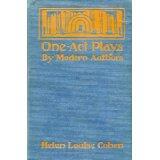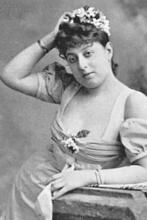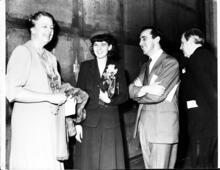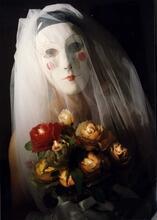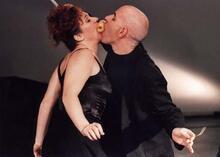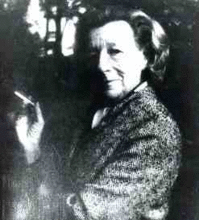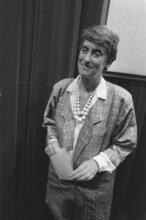Martha Morton
Playwright Martha Morton created textured and challenging roles for women and earned over a million dollars for her work throughout her lifetime. Morton attended Hunter College and began writing at an early age. When theater managers refused to produce a woman’s work, she entered a contest under the name Henry Hazelton, winning $5,000 for her play The Merchant in 1891. She followed this with three more wildly successful plays, Brother John, His Wife’s Father, and A Fool of Fortune. In 1907, denied membership to the American Dramatists Club because of her gender, she created the Society of Dramatic Authors, which was open to both men and women. Resisting expectations of women writers, Morton took a firm hand in production, often casting and directing her own work.
As a female playwright, Martha Morton faced adversity within the male-dominated New York theater world. Despite repeated rejection, she achieved fame and prosperity. Morton not only got her plays produced, but also directed and cast them herself, completely defying the theater industry’s expectations or vision of women’s involvement.
Early Life and Career
Born in New York City to Joseph and Amelia (Marks) Morton on October 10, 1865, Martha attended the city’s public schools and Normal College (later Hunter College). She began writing at a young age. “It was fore-ordained by heredity that I should write,” Morton explained in a 1904 Theater Advertiser interview, citing her mother as the one who “transmitted to me her taste for play reading.”
She struggled to get her plays onstage. In her early twenties, when she tried to get her first play, Helene, produced, one of several managers who rejected it told Morton, “a woman playwright on my stage, why it would demoralize the entire company.” Defiant, she adopted a male pseudonym, Henry Hazleton, in order to find a producer for her second play, The Merchant. She won a contest sponsored by the World, a New York daily, which offered five thousand dollars and a production of the best play entered. The Merchant opened at Union Square Theater in 1891 to positive reviews and immediately sold for fifteen thousand dollars. After the success of her first play, Morton wrote and produced Brother John (1893), His Wife’s Father (1895), and A Fool of Fortune (1896), the profits from which totaled over $250,000. Her prosperity did not lead her to lose sight of her convictions. She took her role as a dramatist seriously and approached her work with political and feminist sensibilities.
Career Successes and Feminist Work
“Womanhood is a tragedy today,” Morton commented in the 1904 interview in the Theater Advertiser. “My next play will be one about suffrage for women,” she announced. “It is the one thing that American women need, because it will furnish them a balance. They have been so loved and petted and sheltered that they have lacked what suffrage will give them, a sense of responsibility.” In January 1907, after she was refused membership to the American Dramatists Club because of her gender, Morton founded the Society of Dramatic Authors, establishing a basic level of enfranchisement for women in her field. Men were invited to join the new society because, as Morton said, “the drama is universal.... All dramatists are one in their work; therefore, as moderns, we may make no restrictions of nationality or sex.” Morton had a pronounced commitment to women, recognizing the challenges they encountered in all facets of theater.
Martha Morton also resisted stereotypes by creating strong, independent female characters, such as Anna, the protagonist in On the Eve (1909), an upper-class woman in Russia during the 1905 Revolution who works for the cause. Morton’s artistry followed American drama’s movement toward realism and away from melodrama. She was a box office success but did not always attract critical praise for her plays. In 1897, one Chicago reviewer scathingly wrote that her play A Bachelor’s Romance was “in texture a flimsy bit of air-spun gossamer, but it lacks all the gossamer’s dainty grace and airy beauty.” That “flimsy bit of air-spun gossamer” netted $250,000 for Morton, less than a quarter of her lifetime’s earnings. Morton authored over twenty-five other plays, most notably The Movers (1907), a play from midcareer revived several times by popular demand, and Three of Hearts (1915), one of her last plays, which was produced in London and elsewhere abroad.
In 1897, at age thirty-two, Morton married Hermann Conheim, a Jewish trader and importer. Though she lived in New York during an era of the mass immigration of Eastern European Jews and flourishing Yiddish theater, she did not become involved with Yiddish theater circles or immigrant feminists, and never included overt Jewish content in her work. In 1918, she addressed a group of Jewish women in Brooklyn on the insidiousness of movies. She described how cinema lacked the crucial element of live theater, a direct connection to the written and spoken word.
Later Life and Legacy
On February 18, 1925, at age fifty-nine, Martha Morton died of heart disease at her home in New York. Playwriting earned her over a million dollars over the course of her career. She was a trailblazer for women’s full participation in the theater, doing them justice by creating good roles onstage and supporting her colleagues offstage. Morton’s drive helped her deflect critical attacks on her work. In 1896, she told the New York Mirror, “So long as the public approve [the play], I should be satisfied, for, after all, the esteem and approval of the playgoers is the thing that we seek to gain.”
Selected Works by Martha Morton
A Bachelor’s Romance (1896).
Brother John (1893).
A Fool of Fortune (1896).
Helene [also known as The Refugee’s Daughter] (1888).
His Wife’s Father (1895).
The Merchant (1890).
The Movers (1907).
On the Eve (1909).
Three of Hearts (1915).
AJYB 24:184, 27:151.
Gipson, Rosemary. “Martha Morton: America’s First Professional Woman Playwright.” Theatre Survey (November 1982): 220.
Morton, Martha. Clippings file. New York Public Library at Lincoln Center, and Ser 2. Vol. 281, Robinson Locke Collection, New York Public Library at Lincoln Center.
Obituary. NYTimes, February 20, 1925, 17:4.
UJE.

